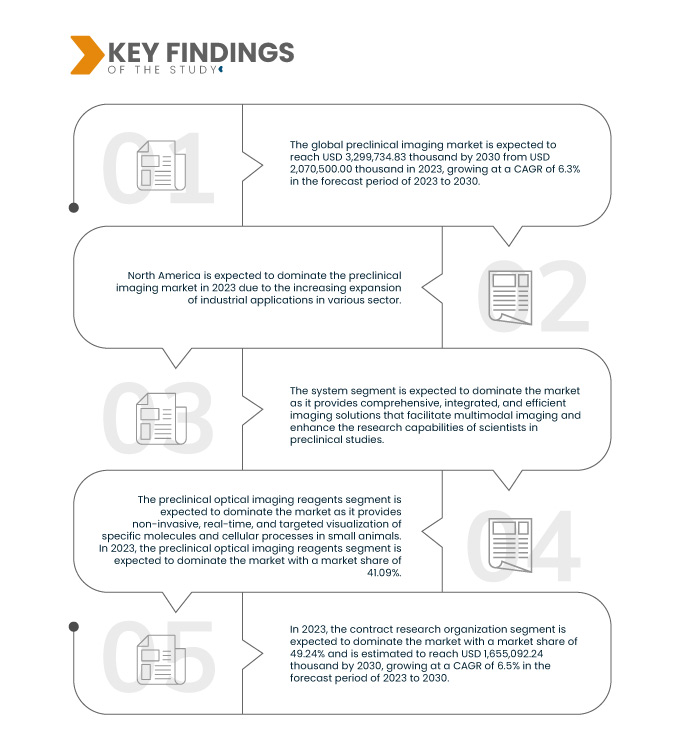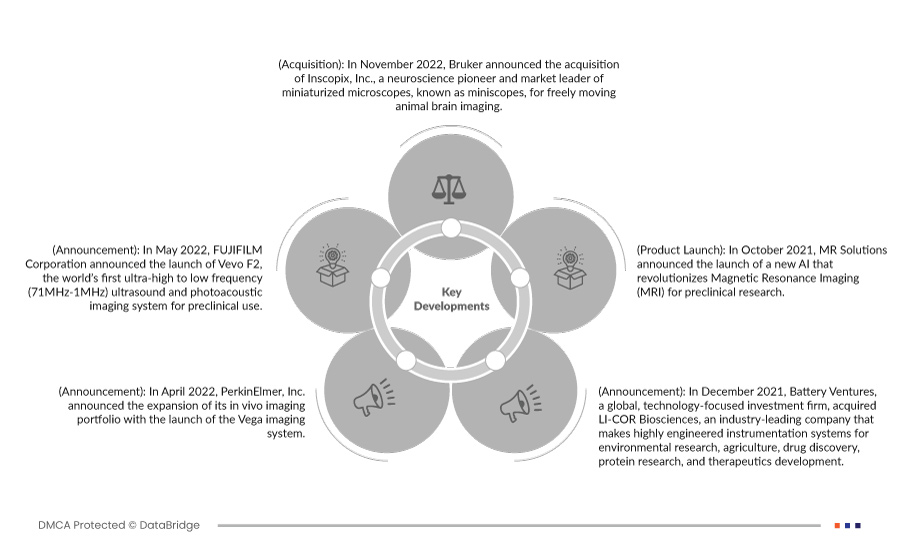前臨床イメージングとは、動物を治療する前に、さまざまな画像診断法を用いて動物の生物学的プロセスを視覚化し研究することを指します。 臨床試験これらのシステムは、研究者が病気のメカニズムを理解し、潜在的な薬剤候補を評価し、治療効果を監視するのに役立ちます。イメージング分野における技術の進歩は、世界的な前臨床イメージング市場の成長を促進する上で重要な役割を果たしています。
高解像度などの最新の画像技術 磁気共鳴画像 (MRI)、マイクロコンピュータ断層撮影 (マイクロCT)、および高度な超音波により、研究者は生物学的構造のより鮮明で詳細な画像を得ることができます。マルチモーダル画像システムの統合は、前臨床画像市場におけるもう1つの進歩です。これらのシステムは、PET-CTやPET-MRIなどの複数の画像技術を組み合わせて補完的な情報を提供し、前臨床研究の精度を高めます。これにより、研究者は病気や治療の複数の側面を同時に調査できるため、より包括的で信頼性の高い結果が得られます。
さらに、画像解析とデータ処理アルゴリズムも大幅に改善されました。高度なソフトウェアツールと機械学習アルゴリズムにより、研究者は画像から定量データを抽出し、画像処理タスクを自動化し、データ分析の精度と効率を向上させることができます。これらの進歩により、時間を節約し、前臨床研究の再現性と信頼性が向上します。
完全なレポートは@でご覧くださいhttps://www.databridgemarketresearch.com/reports/global-preclinical-imaging-market
データブリッジマーケットリサーチの分析によると、 世界の前臨床イメージング市場 2023年から2030年の予測期間中に6.3%のCAGRで成長し、2030年までに3,299,734.83千米ドルに達すると予想されています。
研究の主な結果
慢性疾患の発生率増加が市場の成長を牽引する可能性
がん、心血管疾患、神経疾患などの慢性疾患は、世界中の医療システムにとって大きな負担となっています。前臨床イメージングは、これらの疾患の根本的なメカニズムを理解し、効果的な治療介入を開発する上で重要な役割を果たします。
前臨床イメージングは、病気の進行、治療への反応、潜在的な薬剤候補の評価に関する貴重な洞察を提供します。これにより、研究者は動物モデルで生物学的プロセスを視覚化して研究することができ、病気のメカニズムをより深く理解し、標的療法の開発に役立ちます。前臨床イメージングは、病気の進行と治療の有効性を非侵襲的に監視することで、薬剤開発プロセスを合理化し、臨床試験の失敗のリスクを軽減するのに役立ちます。
慢性疾患の発生率の増加により、革新的で効果的な治療オプションに対する強い需要が生まれています。製薬会社や研究機関は、前臨床イメージング技術を活用して、新しい治療法の開発を加速しています。マイクロ CT、MRI、PET などのイメージング モダリティは、詳細な解剖学的および機能的情報を提供し、研究者が疾患の進行を追跡し、治療への反応を評価し、潜在的な治療薬の安全性と有効性を評価することを可能にします。
レポートの範囲と市場セグメンテーション
|
レポートメトリック
|
詳細
|
|
予測期間
|
2023年から2030年
|
|
基準年
|
2022 (2015~2020年にカスタマイズ可能)
|
|
歴史的な年
|
2021
|
|
定量単位
|
収益は1000米ドル、価格は米ドル
|
|
対象セグメント
|
製品(システムとサービス)、試薬(前臨床光学イメージング試薬、前臨床核イメージング試薬、前臨床MRI造影剤、前臨床超音波造影剤、前臨床CT造影剤)、アプリケーション(研究開発、創薬、バイオ流通、癌細胞検出、 バイオマーカー、その他)、エンドユーザー(契約研究機関、製薬・バイオテクノロジー企業、学術・政府研究機関、診断センターなど)
|
|
対象国
|
米国、カナダ、メキシコ、英国、ドイツ、スペイン、フランス、イタリア、スイス、オランダ、ベルギー、トルコ、ロシア、その他のヨーロッパ諸国、中国、日本、オーストラリア、韓国、インド、シンガポール、タイ、マレーシア、インドネシア、フィリピン、その他のアジア太平洋諸国、ブラジル、アルゼンチン、その他の南米諸国、南アフリカ、UAE、イスラエル、サウジアラビア、エジプト、その他の中東およびアフリカ諸国
|
|
対象となる市場プレーヤー
|
PerkinElmer Inc. (米国)、FUJIFILM Corporation (日本)、Hologic, Inc. (米国)、Bruker (ドイツ)、Zeiss International (ドイツ)、Agilent Technologies, Inc. (米国)、Hamamatsu Photonics KK (米国)、SOFIE (米国)、Cubresa Inc. (カナダ)、Vieworks Co., Ltd. (韓国)、LI-COR (米国)、Inc.、Aspect Imaging Ltd. (イスラエル)、Berthold Technologies GmbH & Co.KG (ドイツ)、MILabs BV (オランダ)、Trifoil Imaging (米国)、Mediso Ltd (ハンガリー)、IVIM Technology Inc. (韓国)、MR Solutions (英国)、Advanced Molecular Vision, Inc (米国)、AI4R (フランス)、Photon etc. (カナダ)、KUB TECHNOLOGIES INC (米国)。
|
|
レポートで取り上げられているデータポイント
|
Data Bridge Market Research がまとめた市場レポートには、市場価値、成長率、セグメンテーション、地理的範囲、主要プレーヤーなどの市場シナリオに関する洞察に加えて、専門家による詳細な分析、患者の疫学、パイプライン分析、価格分析、規制の枠組みも含まれています。
|
セグメント分析
世界の前臨床イメージング市場は、製品、試薬、アプリケーション、エンドユーザーに基づいて 4 つの主要なセグメントに分類されます。
- 製品タイプに基づいて、市場はシステムとサービスに分類されます。
2023年には、システム部門が66.42%の市場シェアで市場を支配すると予想されています。
2023年には、システムセグメントが66.42%の市場シェアで市場を支配すると予想されており、マルチモーダルイメージングを容易にし、前臨床研究における科学者の研究能力を強化する包括的、統合的、効率的なイメージングソリューションを提供します。。
- 試薬に基づいて、市場は前臨床光学イメージング試薬、前臨床核イメージング試薬、前臨床MRI造影剤、前臨床超音波造影剤、および前臨床CT造影剤に分類されます。
2023年には、前臨床光学イメージング試薬セグメントが市場を支配すると予想されています。
2023年には、小動物の特定の分子と細胞プロセスを非侵襲的かつリアルタイムで標的を絞って可視化する前臨床光学イメージング試薬セグメントが、41.09%の市場シェアで市場を支配すると予想されています。
- アプリケーションに基づいて、市場は研究開発、創薬、バイオディストリビューション、癌細胞検出、バイオマーカー、その他に分類されています。2023年には、研究開発セグメントが35.59%の市場シェアで市場を支配すると予想されています。
- エンドユーザーに基づいて、市場は契約研究機関、製薬およびバイオテクノロジー企業、学術および政府研究機関、診断センター、その他に分類されます。2023年には、契約研究機関セグメントが49.24%の市場シェアで市場を支配すると予想されます。
主要プレーヤー
データブリッジマーケットリサーチは、パーキンエルマー社(米国)、富士フイルム株式会社(日本)、ホロジック社(米国)、ブルカー社(ドイツ)、ツァイスインターナショナル社(ドイツ)を市場プレーヤーとして分析しています。
市場動向
- 2022年11月、ブルカーは、自由に動く動物の脳を撮影するためのミニスコープとして知られる小型顕微鏡の神経科学の先駆者であり市場リーダーであるInscopix, Inc.の買収を発表しました。これにより、組織はより多くの収益を生み出すことができました。
- 富士フイルム株式会社は、2022年5月に世界初の超高周波から低周波(71MHz~1MHz)の超音波および光音響イメージングシステムであるVevo F2の発売を発表しました。Vevo F2はHD画像処理技術を搭載し、トランスデューサーからディスプレイ画面までのまったく新しい信号経路を導入しています。これにより画像の鮮明度が向上し、マルチライン処理と組み合わせることで、前世代のプラットフォームよりもフレームレートが大幅に向上しました。
- 2022年4月、パーキンエルマー社は、Vegaイメージングシステムの発売により、生体内イメージングポートフォリオの拡大を発表しました。これにより、同社の製品ポートフォリオと総収益が増加しました。
- 2021年12月、テクノロジーに特化したグローバル投資会社であるバッテリーベンチャーズは、環境研究、農業、創薬、タンパク質研究、治療薬開発のための高度に設計された計測システムを製造する業界トップの企業であるLI-CORバイオサイエンスを買収しました。
- 2021年10月、MRソリューションズは、前臨床研究のための磁気共鳴画像(MRI)に革命を起こす新しいAIの発売を発表しました。これにより、組織はより多くの収益を生み出すことができました。
地域分析
地理的に見ると、市場レポートでカバーされている国は、米国、カナダ、メキシコ、英国、ドイツ、スペイン、フランス、イタリア、スイス、オランダ、ベルギー、トルコ、ロシア、その他のヨーロッパ諸国、中国、日本、オーストラリア、韓国、インド、シンガポール、タイ、マレーシア、インドネシア、フィリピン、その他のアジア太平洋諸国、ブラジル、アルゼンチン、その他の南米諸国、南アフリカ、UAE、イスラエル、サウジアラビア、エジプト、その他の中東およびアフリカ諸国です。
Data Bridge Market Research の分析によると:
北米は、2023年から2030年の予測期間中、世界の前臨床イメージング市場で最も急速に成長し、支配的な地域です。
北米は、さまざまなメーカーによる投資レベルが高く、この地域で技術の進歩が進んでいることから、世界の前臨床イメージング市場を支配すると予想されています。北米は、市場シェアと市場収益の面で世界の前臨床イメージング市場を支配すると予想されており、予測期間中もその優位性は高まり続けるでしょう。この地域では、先進技術の採用が進み、新製品が発売されています。
世界の前臨床イメージング市場レポートの詳細については、ここをクリックしてください。https://www.databridgemarketresearch.com/reports/global-preclinical-imaging-market














